This series of articles focusing on the 2023 general elections in Nigeria stems from an initiative launched in 2022 by Dr Barbara Morovich, IFRA-Nigeria director, and Dr Cyrielle Maingraud-Martinaud: the Elections Observatory. Through it Nigerian researchers documented the concrete organization and experiences of elections in Nigeria.
By choosing a variety of locations and foci from which to examine the 2023 elections, the articles that follow offer a view “from the inside” and from a local perspective in South-Western Nigerian localities and states. Adedeji Adebayo examines the strategies used by political parties to mobilize voters, both in political party secretariats and at polling stations in Ikere, a Local Government Area in Ekiti state. Working on the Iwajowa Local Government border area, Oyo State, Okechukwu Livingstone Ikefuama investigated how local conceptions of belonging, sometimes instrumentalized by candidates and political parties, can influence political participation to the extent of including non-Nigerian citizens in the electorate. Finally, Olasupo Olakunle Thompson studied the role played by central actors of the electoral process: the Independent National Electoral Commission (INEC) ad-hoc collation officers in Abeokuta, Ogun State. Dr Sa’eed Husaini and Dr Delphine Manetta, are the coordinators of this Working Paper n°60.
Continue Reading
 New Culture Studio and IFRA-Nigeria are putting together a stage play "Law for Sale" as part of the French Embassy Fund project Nigerian Alternative Archives. This play written by Emmanuel Orisunmibare and produced by Fasiat Busari, is a witty drama and satire on the decadence and rot eating deep into the society as far as the rule of law is concerned. The play is built on the life of a chief judge, who sells the law to the highest bidder. His inability to control his desire to amass wealth by selling the law led to a catastrophic revolt from the people.
New Culture Studio and IFRA-Nigeria are putting together a stage play "Law for Sale" as part of the French Embassy Fund project Nigerian Alternative Archives. This play written by Emmanuel Orisunmibare and produced by Fasiat Busari, is a witty drama and satire on the decadence and rot eating deep into the society as far as the rule of law is concerned. The play is built on the life of a chief judge, who sells the law to the highest bidder. His inability to control his desire to amass wealth by selling the law led to a catastrophic revolt from the people.
Practical information:
Date & Time: 31 May 2025, 4pm (arrival time), 6pm (play time)
Location: New Culture Studio, Ibadan
Purchase of tickets: https://paystack.com/buy/emmylyskilzproductions_lawforsale
Price: 5, 000 naira, free for primary and secondary school students, IFRA-Nigeria fellows
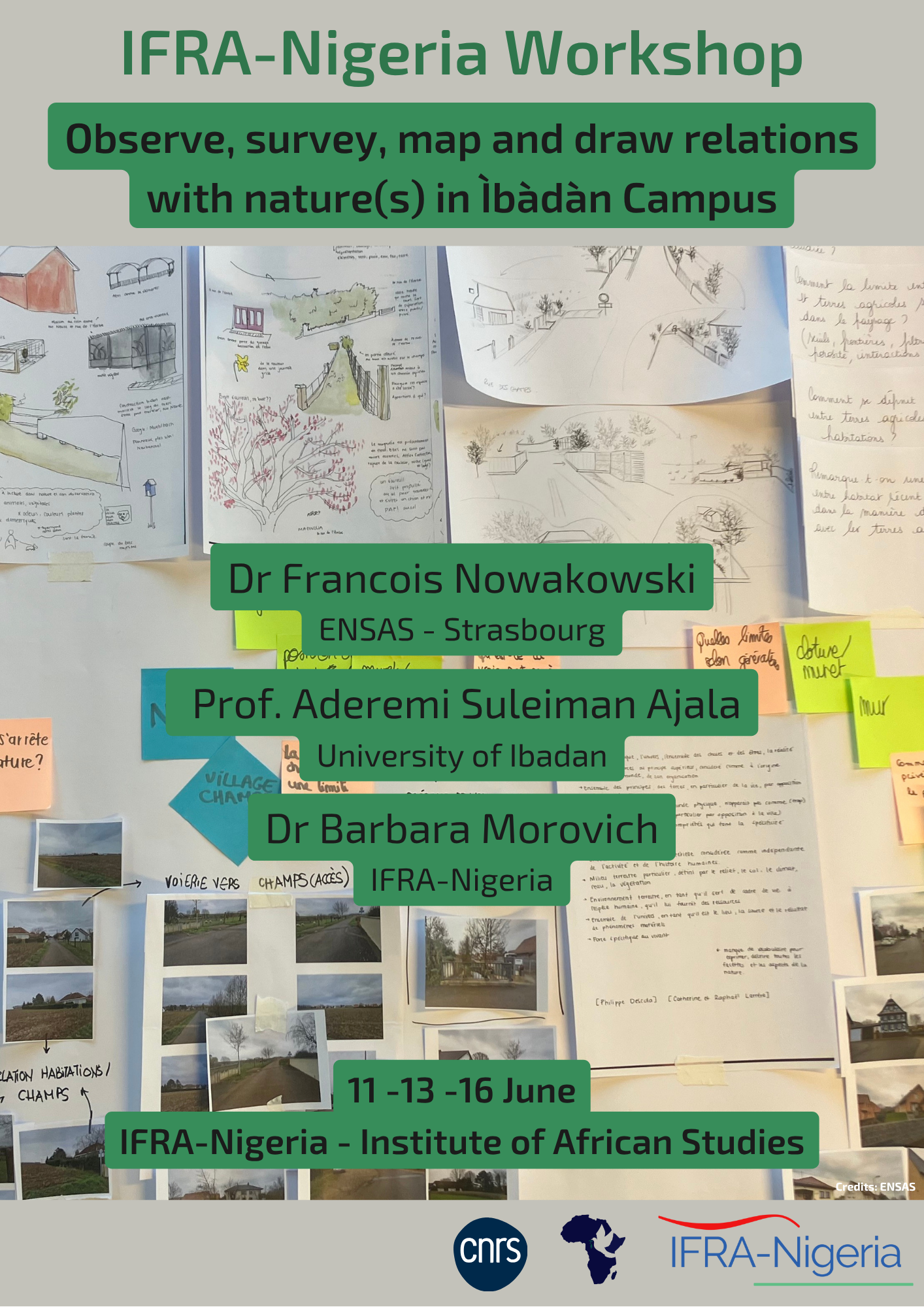 IFRA-Nigeria, in collaboration with the Department of Archaeology and Anthropology of the University of Ibadan, and the Ecole Nationale d'Architecture de Strasbourg (France), organises a workshop on "Observe, survey, map and draw relations with nature(s) in Ìbàdàn Campus". This event will, over the course of three days, include theory, fieldwork and sessions dedicated to exchange. It will give selected participants the opportunity to experiment with survey protocols involving ethnographic observation, drawing and in-situ writing, but also the chance to question them. Overall, their goal will be to identify different forms of relationship between humans and non-humans on a day-to-day basis on campus, in order to raise awareness of the importance of non-humans on campus. Indeed, these methods of capturing a real experience take time and require one to stop and look, observe and record (Lucas, 2020). This pause, of varying length, will enable participants to rediscover the environment they are observing and trying to capture.
IFRA-Nigeria, in collaboration with the Department of Archaeology and Anthropology of the University of Ibadan, and the Ecole Nationale d'Architecture de Strasbourg (France), organises a workshop on "Observe, survey, map and draw relations with nature(s) in Ìbàdàn Campus". This event will, over the course of three days, include theory, fieldwork and sessions dedicated to exchange. It will give selected participants the opportunity to experiment with survey protocols involving ethnographic observation, drawing and in-situ writing, but also the chance to question them. Overall, their goal will be to identify different forms of relationship between humans and non-humans on a day-to-day basis on campus, in order to raise awareness of the importance of non-humans on campus. Indeed, these methods of capturing a real experience take time and require one to stop and look, observe and record (Lucas, 2020). This pause, of varying length, will enable participants to rediscover the environment they are observing and trying to capture.
Continue Reading
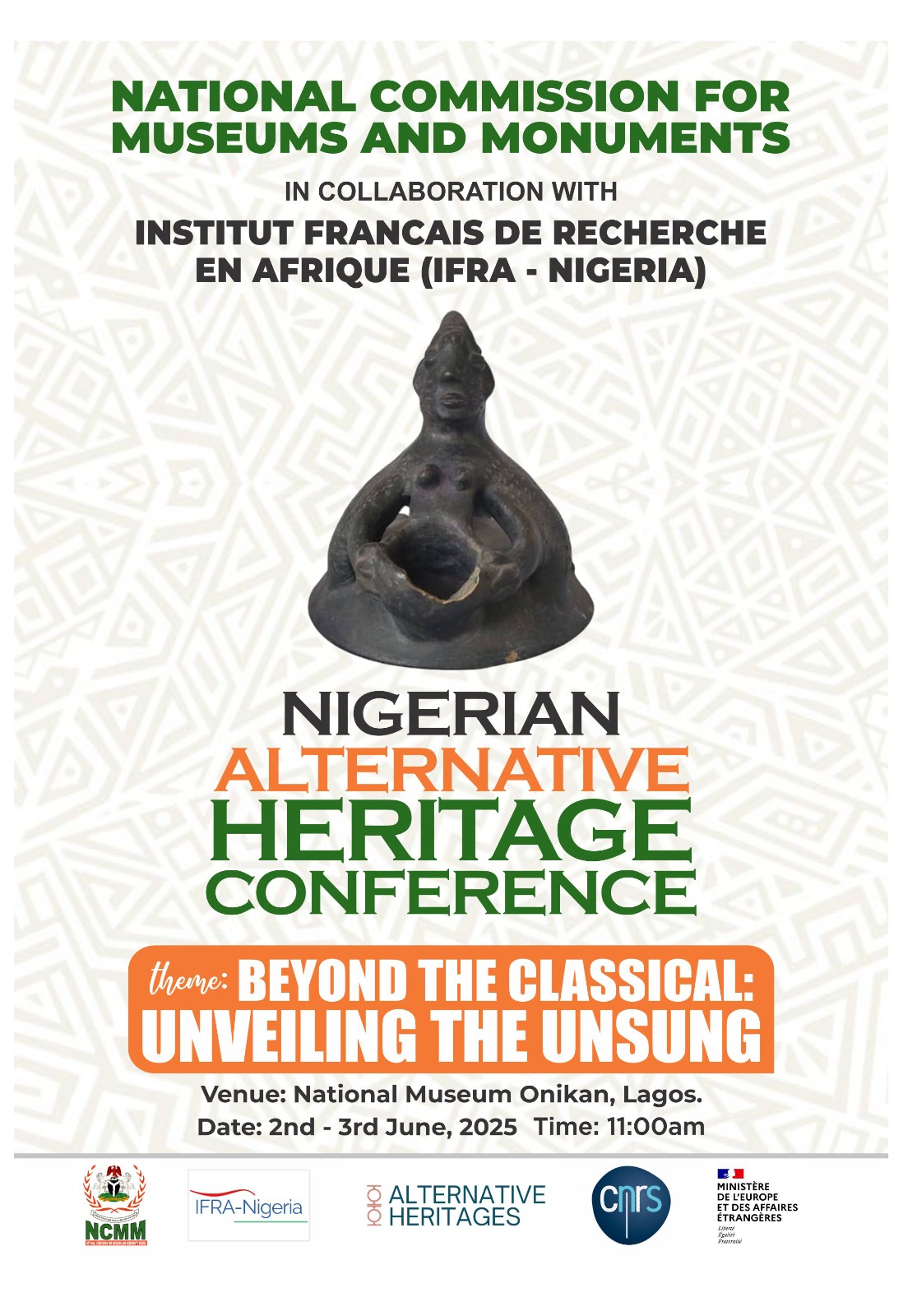 The National Museum Onikan Lagos and IFRA-Nigeria are co-organizing the Alternative Heritages Conference "Beyond the classical: unveiling the unsung" on 2-3 June. Taking place at the National Museum, it's a follow up to the exhibition held between 5 and 16 May, which highlighted forgotten artifacts of Nigerian heritage. This Conference is not only a chance to learn more about Nigeria's heritage, but also to meet professionals and academics, specialists of the topic. In addition, the May exhibition will be back, giving you a chance to (re)visit it! This event is part of our project Nigerian Alternative Heritages, funded by the French Embassy Fund (FEF). Scroll down to register.
The National Museum Onikan Lagos and IFRA-Nigeria are co-organizing the Alternative Heritages Conference "Beyond the classical: unveiling the unsung" on 2-3 June. Taking place at the National Museum, it's a follow up to the exhibition held between 5 and 16 May, which highlighted forgotten artifacts of Nigerian heritage. This Conference is not only a chance to learn more about Nigeria's heritage, but also to meet professionals and academics, specialists of the topic. In addition, the May exhibition will be back, giving you a chance to (re)visit it! This event is part of our project Nigerian Alternative Heritages, funded by the French Embassy Fund (FEF). Scroll down to register.
Continue Reading
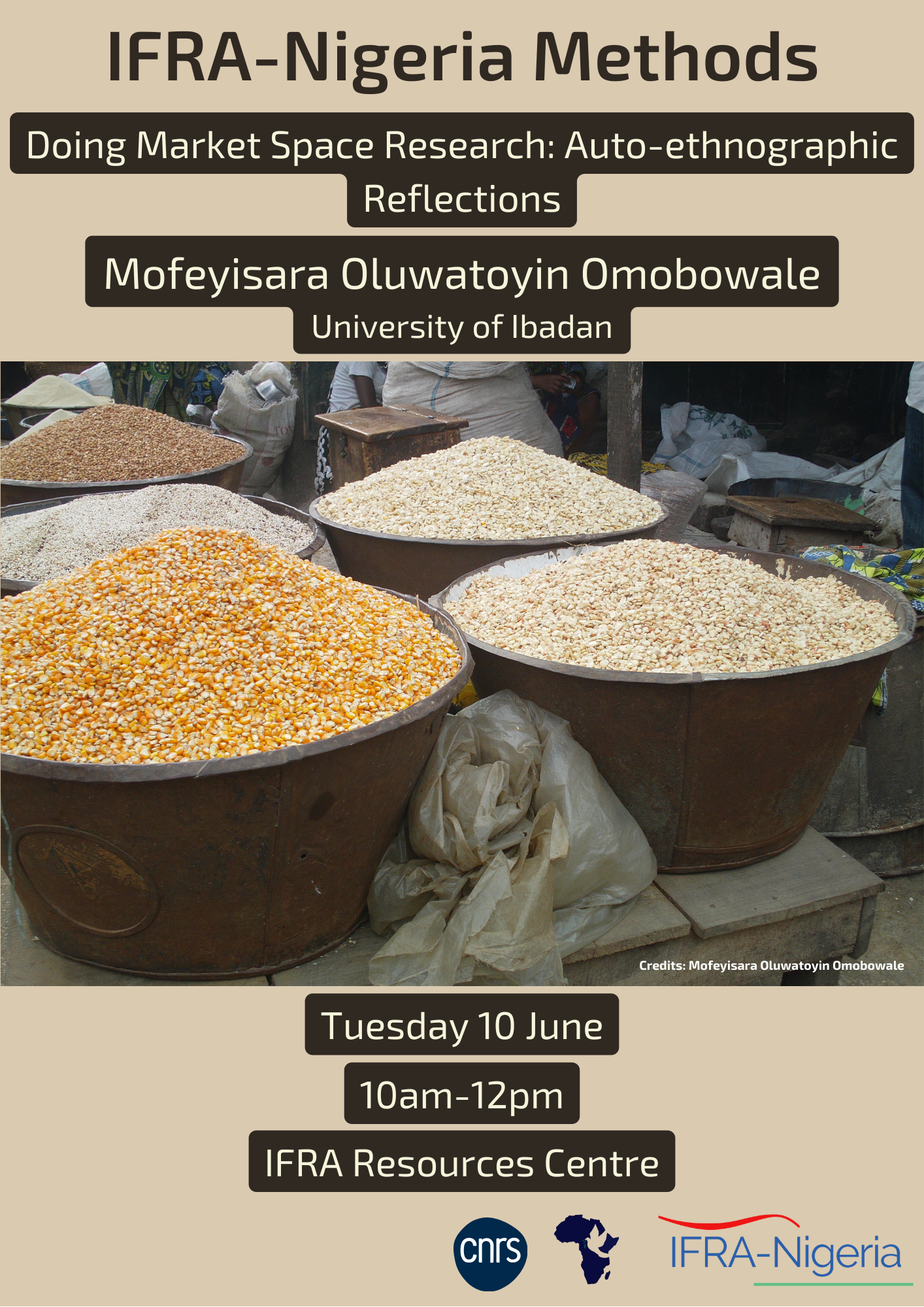 Join us on 10 June, between 10am and 12pm for our latest Methodological Seminar with Mofeyisara Oluwatoyin Omobowale from the Institute of Child Health in the University of Ibadan. She will talk on "Doing Market Space Research: Auto-ethnographic Reflections". The market space is one of the major public spaces in Nigeria that is central to not only economic development but also societal growth and wellbeing. For the Yoruba of South West Nigeria transcends economic activities. The space is potent for diverse disciplinary research, including anthropology, economics, sociology, geography and public health among others.
Join us on 10 June, between 10am and 12pm for our latest Methodological Seminar with Mofeyisara Oluwatoyin Omobowale from the Institute of Child Health in the University of Ibadan. She will talk on "Doing Market Space Research: Auto-ethnographic Reflections". The market space is one of the major public spaces in Nigeria that is central to not only economic development but also societal growth and wellbeing. For the Yoruba of South West Nigeria transcends economic activities. The space is potent for diverse disciplinary research, including anthropology, economics, sociology, geography and public health among others.
This presentation is on the techniques of data collection in market studies. The market is a community within the society, it is rowdy, but organized, chaotic, yet structured with numerous opportunities for studies. This presentation aims to reflectively discuss how she conducted market research over the years. Mofeyisara will recount personal and particular fieldwork experiences and how doing fieldwork in the market spaces has shaped her research from a practical and relational point of view. The seminar will describe the practice of market research as a craft, an adventure filled with surprises, setbacks and potential reorientations.
Continue Reading
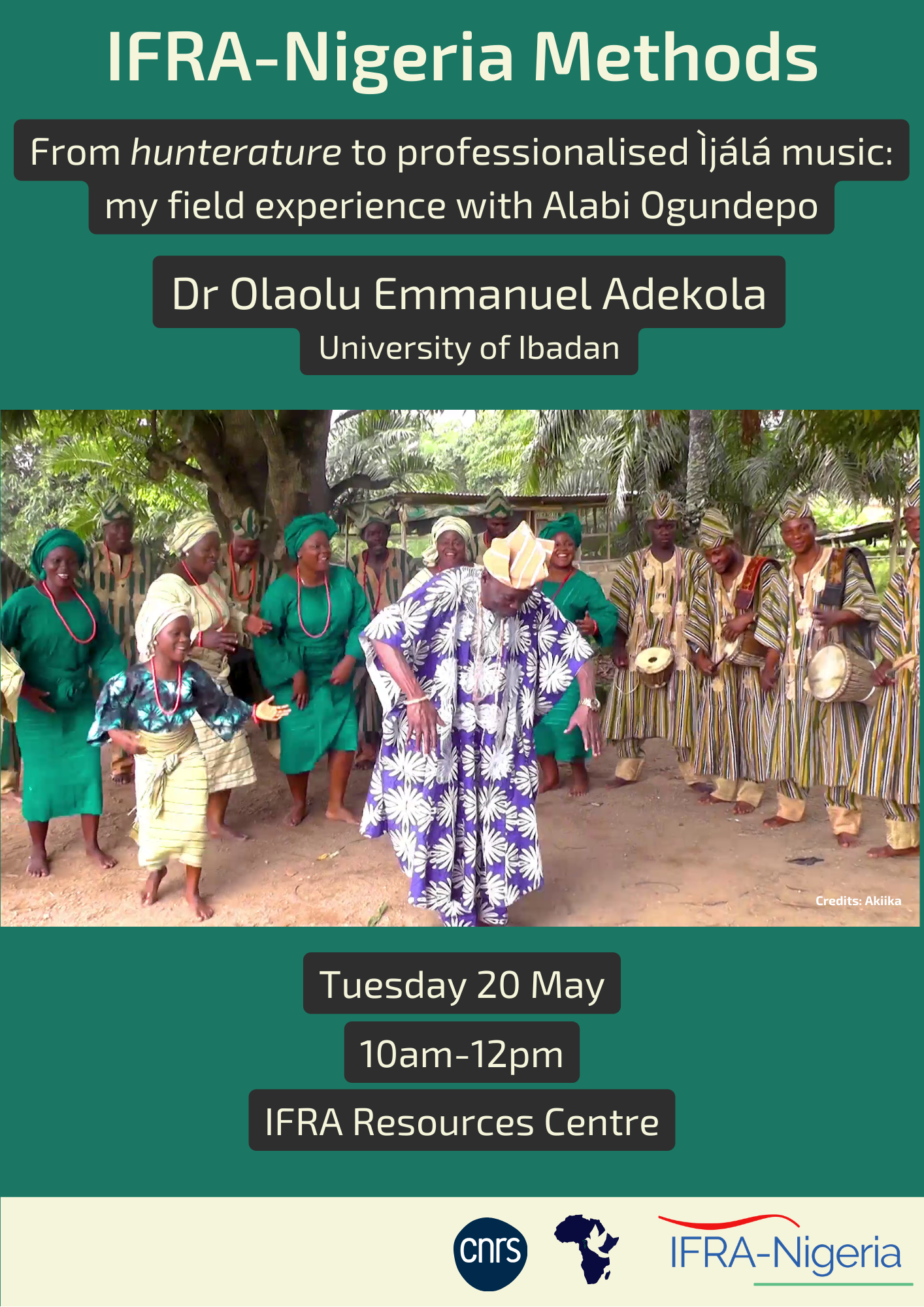 On 20 May, we welcomed Dr Olaolu Emmanuel Adekola, an ethnomusicologist from the University of Ibadan, for a Methodological Seminar on "From hunterature to professionalised Ìjálá music: my field experience with Àlàbí Ògúndépò". Delphine Manetta, IFRA-Nigeria deputy-director, opened the seminar with an introduction of Dr Adekola. A graduate of a Bachelor of Arts from Obafemi Awolowo University, he pursued a Masters of Arts and a Ph.D. in African Musicology at the Institute of African Studies (IAS), University of Ibadan. His topics of research are music education, music migration, agromusicology, and he wrote about Ìjálá and Àgídìgbo music. Today, he is a postgraduate coordinator at the IAS, and also teaches postgraduate students. He is a member of Association of Nigerian Musicologists, Society of Music Educators of Nigeria, and a fellow of Ife Institute of Advanced Studies.
On 20 May, we welcomed Dr Olaolu Emmanuel Adekola, an ethnomusicologist from the University of Ibadan, for a Methodological Seminar on "From hunterature to professionalised Ìjálá music: my field experience with Àlàbí Ògúndépò". Delphine Manetta, IFRA-Nigeria deputy-director, opened the seminar with an introduction of Dr Adekola. A graduate of a Bachelor of Arts from Obafemi Awolowo University, he pursued a Masters of Arts and a Ph.D. in African Musicology at the Institute of African Studies (IAS), University of Ibadan. His topics of research are music education, music migration, agromusicology, and he wrote about Ìjálá and Àgídìgbo music. Today, he is a postgraduate coordinator at the IAS, and also teaches postgraduate students. He is a member of Association of Nigerian Musicologists, Society of Music Educators of Nigeria, and a fellow of Ife Institute of Advanced Studies.
Continue Reading
 New Culture Studio Ibadan and IFRA-Nigeria are co-organizing two-session of a traditional candle-making workshop, on 21 and 22 May. Genny Ray Fragrances will take us through a journey of discovering the rich aromas of Nigeria's culinary heritage, and crafting them into your own spice-infused candle.
New Culture Studio Ibadan and IFRA-Nigeria are co-organizing two-session of a traditional candle-making workshop, on 21 and 22 May. Genny Ray Fragrances will take us through a journey of discovering the rich aromas of Nigeria's culinary heritage, and crafting them into your own spice-infused candle.
Only a few spots are available, to RSVP email This email address is being protected from spambots. You need JavaScript enabled to view it. and This email address is being protected from spambots. You need JavaScript enabled to view it..
Deadline : 20 May 2025.
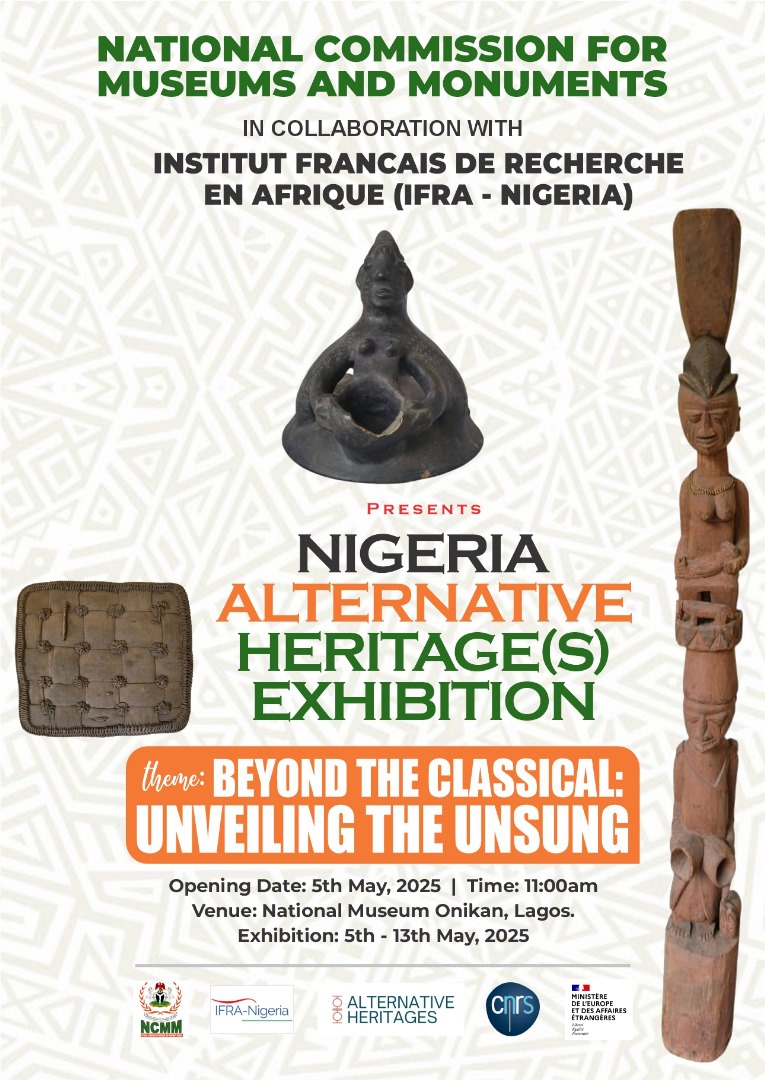 The National Museum of Lagos Onikan and IFRA-Nigeria, as part of their partnership through the Nigerian Alternative Heritages project, organized the exhibition "Beyond the classical: unveiling the unsung", which aims at highlighting underrepresented objects of Nigeria's diverse heritages. This project is funded by the French Embassy Fund.
The National Museum of Lagos Onikan and IFRA-Nigeria, as part of their partnership through the Nigerian Alternative Heritages project, organized the exhibition "Beyond the classical: unveiling the unsung", which aims at highlighting underrepresented objects of Nigeria's diverse heritages. This project is funded by the French Embassy Fund.
You can attend the exhibition, free of charge, until 16 May at the National Museum Lagos.
Continue Reading
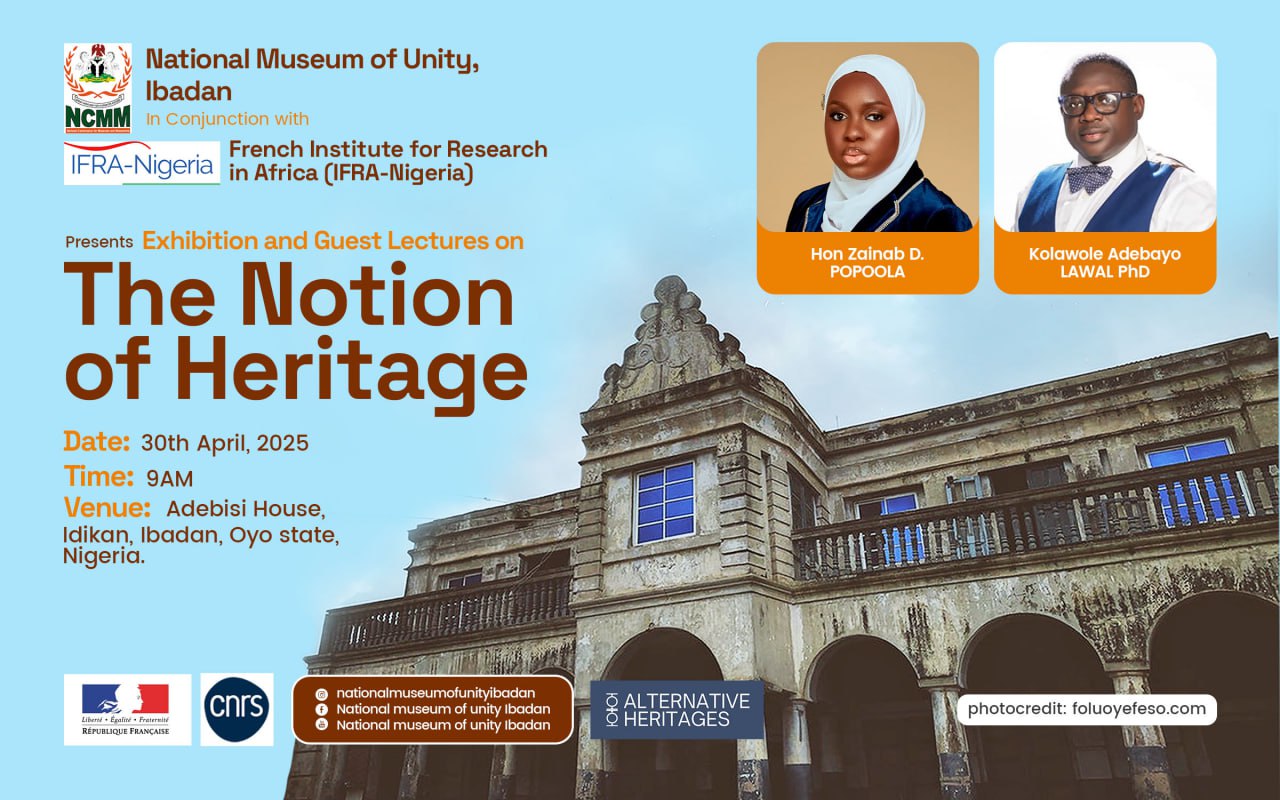 On 30 April, IFRA-Nigeria and the National Museum of Unity of Ibadan organized a mix exhibition and lecture event as part of the French Embassy Fund project "Nigerian Alternative Heritages". As a celebration of International Monument Day, this event explored the "Notion of Heritage", and took place in one of Ibadan's oldest buildings, the Adebisi House, which exceptionally opened its doors to the Museum staff, pupils, Polytechnic students and other members of the public interested in the arts and heritage studies.
On 30 April, IFRA-Nigeria and the National Museum of Unity of Ibadan organized a mix exhibition and lecture event as part of the French Embassy Fund project "Nigerian Alternative Heritages". As a celebration of International Monument Day, this event explored the "Notion of Heritage", and took place in one of Ibadan's oldest buildings, the Adebisi House, which exceptionally opened its doors to the Museum staff, pupils, Polytechnic students and other members of the public interested in the arts and heritage studies.
Continue Reading
 On Tuesday 20 May, IFRA-Nigeria welcomes Dr Olaolu Emmanuel Adekola, researcher at the Institute of African Studies in the University of Ibadan. Dr Adekola will take us through a presentation of his research into the world of Ìjálá music.
On Tuesday 20 May, IFRA-Nigeria welcomes Dr Olaolu Emmanuel Adekola, researcher at the Institute of African Studies in the University of Ibadan. Dr Adekola will take us through a presentation of his research into the world of Ìjálá music.
Indeed, the dynamic nature of African culture, especially Yorùbá culture, makes the study of music (a major aspect of culture) inexhaustible. Many African music have experienced changes in content, instrumentation, ensemble composition as well as performance context, meaning the researcher must adapt to the dynamism of his object of study. One of such music is Ìjálá, the hunters’ poetry, which also serves as an archiving house for Yorùbá philosophy, as performed by Alabi Ògúndépò. Dr Adekola's paper, on which his methodological presentation is based, examines how how Ìjálá music has evolved of the years and how Ògúndépò’s ingenuity, inventiveness and resilience have established the fact that modification on Ìjálá is an attempt to professionalize the art. He will detail his use of ethnographic research design, specifically with key informant interviews and observation to generate data. Finally, his paper argues that Alabi Ògúndépò’s artistic innovativeness and resilience contribute to making Ìjálá a professionalised traditional music and that his music serves as an archiving house through which human sociality and the cultural experience of Yorùbá is being re-conceived, reconstructed and re-contextualised for wider and broader usage.
Continue Reading

We are proud to announce that IFRA-Nigeria will hold a panel on the theme "Living at the Margins:Survival, Belief, Care, and Belonging among Stigmatised Groups in Africa" at the 2025 Lagos Studies Association Conference. For this purpose, we call on researchers to submit abstracts on the subject of marginalisation and resilience, to get a chance to be featured in our panel.
Deadline: 21 May
Scroll to read or download the full ToR.
Continue Reading
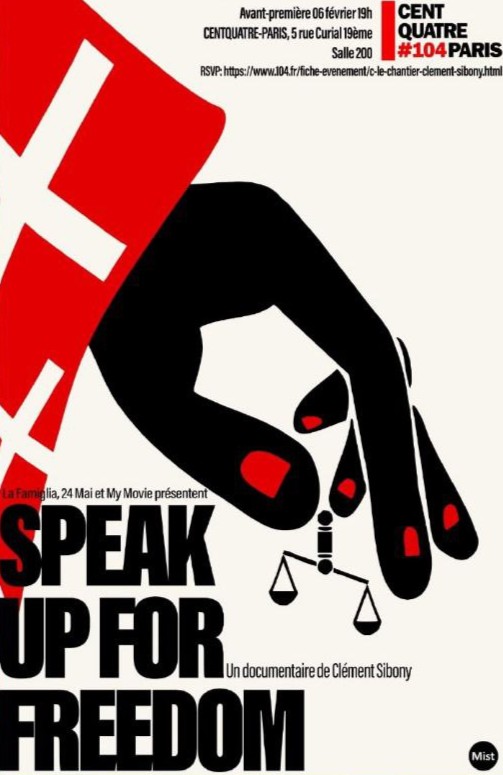 The Thursday Film Series, MIST association and IFRA-Nigeria co-organized on 24 April, a screening of "Speak up for Freedom", a documentary directed by Clément Sibony. The documentary follows six women, members of MIST, who reclaim their voice by creating a theater play. With legal justice out of reach, they stage a fictional trial, an act of defiance that transforms pain into power. Through this deeply moving documentary, we witness their journey of healing, storytelling, and resistance. MIST (Mission of Intervention and Sensitisation against Trafficking) is a French NGO founded by Nigerian women who survived sexual trafficking, and are seeking to provide support for victims.
The Thursday Film Series, MIST association and IFRA-Nigeria co-organized on 24 April, a screening of "Speak up for Freedom", a documentary directed by Clément Sibony. The documentary follows six women, members of MIST, who reclaim their voice by creating a theater play. With legal justice out of reach, they stage a fictional trial, an act of defiance that transforms pain into power. Through this deeply moving documentary, we witness their journey of healing, storytelling, and resistance. MIST (Mission of Intervention and Sensitisation against Trafficking) is a French NGO founded by Nigerian women who survived sexual trafficking, and are seeking to provide support for victims.
Dr Elodie Apard, MIST board member and coordinator of the Life After Trafficking joined us for a lively post-screening discussion. We discussed the making of the documentary and the play, the role art can play in dealing with traumatic memories, the dynamics of exploitation of Nigerian women in Europe, the difficult access to justice, the role of religion and family pressure in trafficking and paths for women to build their life back. Scroll to see some pictures of this event.
If you want to learn more about the subject, we invite you to visit the MIST website and specifically their "True Talk" podcast, in which MIST members reflect on their experiences, as well as the Life After Trafficking page, as well as three of our former projects: Human Trafficking for sexual exploitation research project, Hidden Narratives on Transnational Organised Crimes in West Africa and PACKING.
Continue Reading
 From 22 to 25 April, IFRA-Nigeria’s director, Barbara Morovich, will be in Dakar, Senegal for the Humanistica symposium on “Explorer les usages et pratiques “nouvelles” en Humanités”. This edition of the yearly symposium of the francophone association for digital humanities will question the “new” to address the tools, questions and constraints that are concretely moving the lines of research in the humanities.
From 22 to 25 April, IFRA-Nigeria’s director, Barbara Morovich, will be in Dakar, Senegal for the Humanistica symposium on “Explorer les usages et pratiques “nouvelles” en Humanités”. This edition of the yearly symposium of the francophone association for digital humanities will question the “new” to address the tools, questions and constraints that are concretely moving the lines of research in the humanities.
Continue Reading
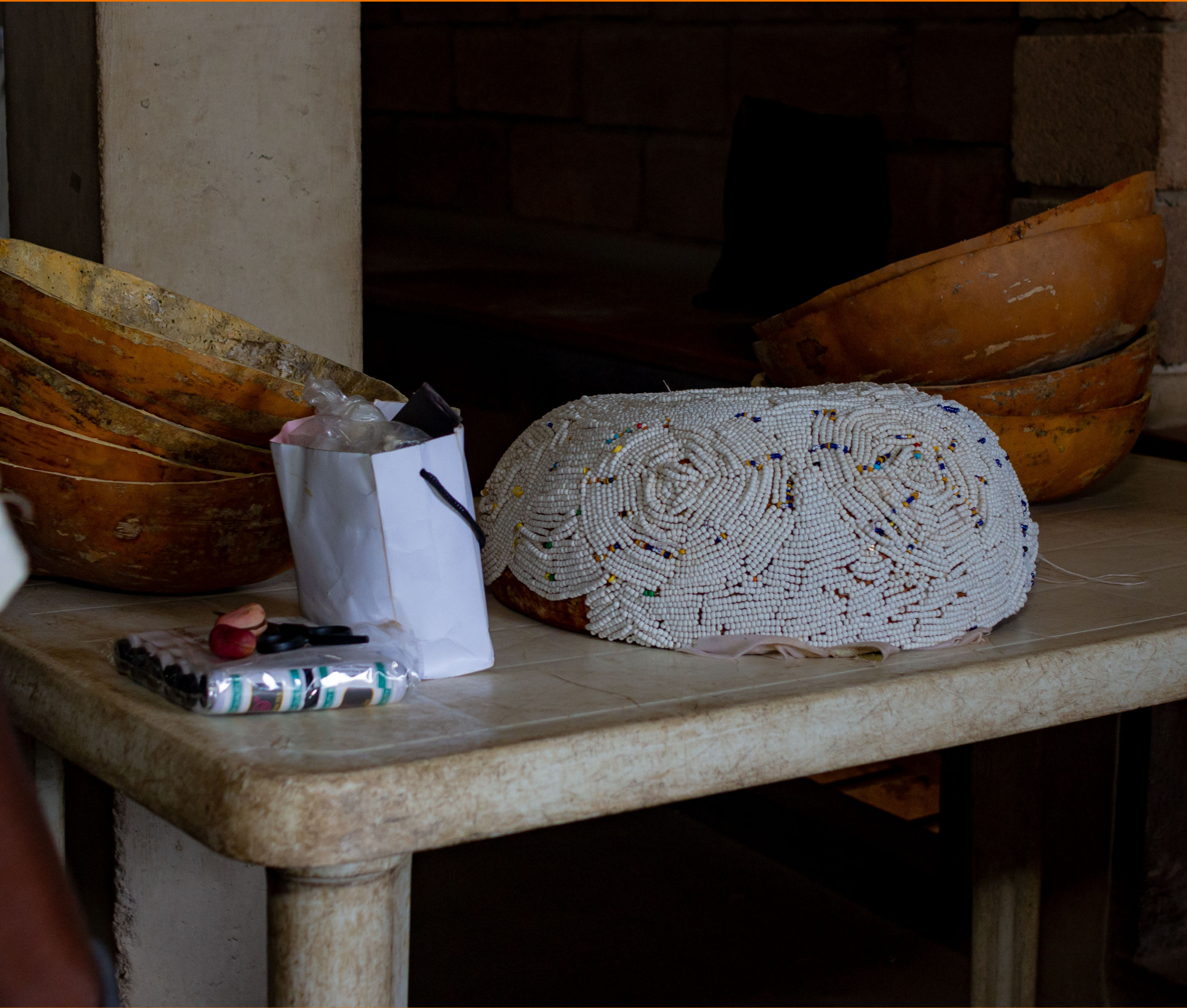 Between 14 and 19 April, IFRA-Nigeria, in collaboration with the New Culture Studio, held an artistic workshop on "Beading our stories". It featured a diverse range of activities each day for nine selected participants, including photographers, researchers, and artists. This event is part of our Alternative Heritages project, which aims to highlight the diversity of Nigerian culture. Scroll below to learn more and see some pictures of the event!
Between 14 and 19 April, IFRA-Nigeria, in collaboration with the New Culture Studio, held an artistic workshop on "Beading our stories". It featured a diverse range of activities each day for nine selected participants, including photographers, researchers, and artists. This event is part of our Alternative Heritages project, which aims to highlight the diversity of Nigerian culture. Scroll below to learn more and see some pictures of the event!
Continue Reading
 The National Museum of Unity, Ibadan and IFRA-Nigeria, cordially invite you to an Exhibition and Guest Lectures on the Notion of Heritage. Organized as part of our French Embassy Fund project Nigerian Alternative Heritages, this event seeks to facilitate meaningful dialogue and critical perspectives on the evolving concept of heritage and showcase Nigerian cultural legacy. It also aligns with the theme of the 2025 International Day for Monuments and Sites: Resilient Heritage: Adapting to a Changing World.
The National Museum of Unity, Ibadan and IFRA-Nigeria, cordially invite you to an Exhibition and Guest Lectures on the Notion of Heritage. Organized as part of our French Embassy Fund project Nigerian Alternative Heritages, this event seeks to facilitate meaningful dialogue and critical perspectives on the evolving concept of heritage and showcase Nigerian cultural legacy. It also aligns with the theme of the 2025 International Day for Monuments and Sites: Resilient Heritage: Adapting to a Changing World.
Starting at 9am on 30 April, there will first be a guided tour of the Adebisi House, highlighting the significant artifacts from Sanusi Adebisi Giwa's collection. Next, Hon. Zainab D. Popoola and Dr. Kolawole A. Lawal, will deliver insightful lectures addressing critical issues such as the varied and evolving meaning of heritage, the transformative nature of this concept and challenges posed to monuments and sites, including sociopolitical and economic issues, climate change, and urban development, and the role of local communities in safeguarding, conserving, and preserving cultural sites.
Practical information:
Date: Wednesday, 30 April, 2025
Time: 9:00 AM
Venue: Adebisi House, Idikan, Ibadan
Audience: This event is open to the public, including children, students, and professionals. No prior registration is required.

 New Culture Studio and IFRA-Nigeria are putting together a stage play "Law for Sale" as part of the French Embassy Fund project Nigerian Alternative Archives. This play written by Emmanuel Orisunmibare and produced by Fasiat Busari, is a witty drama and satire on the decadence and rot eating deep into the society as far as the rule of law is concerned. The play is built on the life of a chief judge, who sells the law to the highest bidder. His inability to control his desire to amass wealth by selling the law led to a catastrophic revolt from the people.
New Culture Studio and IFRA-Nigeria are putting together a stage play "Law for Sale" as part of the French Embassy Fund project Nigerian Alternative Archives. This play written by Emmanuel Orisunmibare and produced by Fasiat Busari, is a witty drama and satire on the decadence and rot eating deep into the society as far as the rule of law is concerned. The play is built on the life of a chief judge, who sells the law to the highest bidder. His inability to control his desire to amass wealth by selling the law led to a catastrophic revolt from the people. IFRA-Nigeria, in collaboration with the Department of Archaeology and Anthropology of the University of Ibadan, and the Ecole Nationale d'Architecture de Strasbourg (France), organises a workshop on "Observe, survey, map and draw relations with nature(s) in Ìbàdàn Campus". This event will, over the course of three days, include theory, fieldwork and sessions dedicated to exchange. It will give selected participants the opportunity to experiment with survey protocols involving ethnographic observation, drawing and in-situ writing, but also the chance to question them. Overall, their goal will be to identify different forms of relationship between humans and non-humans on a day-to-day basis on campus, in order to raise awareness of the importance of non-humans on campus. Indeed, these methods of capturing a real experience take time and require one to stop and look, observe and record (Lucas, 2020). This pause, of varying length, will enable participants to rediscover the environment they are observing and trying to capture.
IFRA-Nigeria, in collaboration with the Department of Archaeology and Anthropology of the University of Ibadan, and the Ecole Nationale d'Architecture de Strasbourg (France), organises a workshop on "Observe, survey, map and draw relations with nature(s) in Ìbàdàn Campus". This event will, over the course of three days, include theory, fieldwork and sessions dedicated to exchange. It will give selected participants the opportunity to experiment with survey protocols involving ethnographic observation, drawing and in-situ writing, but also the chance to question them. Overall, their goal will be to identify different forms of relationship between humans and non-humans on a day-to-day basis on campus, in order to raise awareness of the importance of non-humans on campus. Indeed, these methods of capturing a real experience take time and require one to stop and look, observe and record (Lucas, 2020). This pause, of varying length, will enable participants to rediscover the environment they are observing and trying to capture. The National Museum Onikan Lagos and IFRA-Nigeria are co-organizing the Alternative Heritages Conference "Beyond the classical: unveiling the unsung" on 2-3 June. Taking place at the National Museum, it's a follow up to the exhibition held between 5 and 16 May, which highlighted forgotten artifacts of Nigerian heritage. This Conference is not only a chance to learn more about Nigeria's heritage, but also to meet professionals and academics, specialists of the topic. In addition, the May exhibition will be back, giving you a chance to (re)visit it! This event is part of our project
The National Museum Onikan Lagos and IFRA-Nigeria are co-organizing the Alternative Heritages Conference "Beyond the classical: unveiling the unsung" on 2-3 June. Taking place at the National Museum, it's a follow up to the exhibition held between 5 and 16 May, which highlighted forgotten artifacts of Nigerian heritage. This Conference is not only a chance to learn more about Nigeria's heritage, but also to meet professionals and academics, specialists of the topic. In addition, the May exhibition will be back, giving you a chance to (re)visit it! This event is part of our project  Join us on 10 June, between 10am and 12pm for our latest Methodological Seminar with Mofeyisara Oluwatoyin Omobowale from the Institute of Child Health in the University of Ibadan. She will talk on "Doing Market Space Research: Auto-ethnographic Reflections". The market space is one of the major public spaces in Nigeria that is central to not only economic development but also societal growth and wellbeing. For the Yoruba of South West Nigeria transcends economic activities. The space is potent for diverse disciplinary research, including anthropology, economics, sociology, geography and public health among others.
Join us on 10 June, between 10am and 12pm for our latest Methodological Seminar with Mofeyisara Oluwatoyin Omobowale from the Institute of Child Health in the University of Ibadan. She will talk on "Doing Market Space Research: Auto-ethnographic Reflections". The market space is one of the major public spaces in Nigeria that is central to not only economic development but also societal growth and wellbeing. For the Yoruba of South West Nigeria transcends economic activities. The space is potent for diverse disciplinary research, including anthropology, economics, sociology, geography and public health among others. On 20 May, we welcomed Dr Olaolu Emmanuel Adekola, an ethnomusicologist from the University of Ibadan, for a Methodological Seminar on "From
On 20 May, we welcomed Dr Olaolu Emmanuel Adekola, an ethnomusicologist from the University of Ibadan, for a Methodological Seminar on "From  New Culture Studio Ibadan and IFRA-Nigeria are co-organizing two-session of a traditional candle-making workshop, on 21 and 22 May. Genny Ray Fragrances will take us through a journey of discovering the rich aromas of Nigeria's culinary heritage, and crafting them into your own spice-infused candle.
New Culture Studio Ibadan and IFRA-Nigeria are co-organizing two-session of a traditional candle-making workshop, on 21 and 22 May. Genny Ray Fragrances will take us through a journey of discovering the rich aromas of Nigeria's culinary heritage, and crafting them into your own spice-infused candle. The National Museum of Lagos Onikan and IFRA-Nigeria, as part of their partnership through the
The National Museum of Lagos Onikan and IFRA-Nigeria, as part of their partnership through the  On 30 April, IFRA-Nigeria and the National Museum of Unity of Ibadan organized a mix exhibition and lecture event as part of the French Embassy Fund project "
On 30 April, IFRA-Nigeria and the National Museum of Unity of Ibadan organized a mix exhibition and lecture event as part of the French Embassy Fund project "
 The
The  From 22 to 25 April, IFRA-Nigeria’s director, Barbara Morovich, will be in Dakar, Senegal for the
From 22 to 25 April, IFRA-Nigeria’s director, Barbara Morovich, will be in Dakar, Senegal for the  Between 14 and 19 April, IFRA-Nigeria, in collaboration with the
Between 14 and 19 April, IFRA-Nigeria, in collaboration with the
Social Media
Mailing List